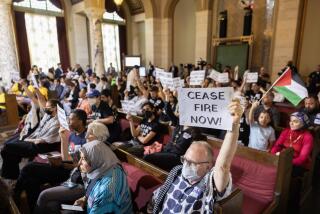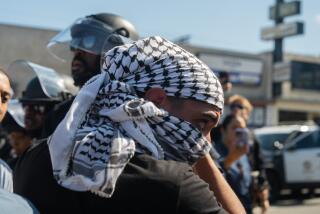Blacks Won’t End Korean Store Boycott : Racial tension: Meeting with mayor, police officials fails to sway protest of shooting by shopkeeper.
- Share via
Black community leaders refused to call off a boycott of a Korean-owned market in South-Central Los Angeles despite a meeting Friday with Mayor Tom Bradley and police officials, who told them the June 4 shooting of a black man in the store was justified.
Bradley arranged the meeting in his office in an attempt to end the boycott, which has increased tensions between Korean merchants and African-American residents of the impoverished neighborhood.
“I think we made a major step forward in the issues that caused the tension,” Bradley said shortly after the 1 1/2-hour meeting. Asked whether the community protest would end soon, he said, “That’s up to the people who are organizing the boycott.”
Community activist Rev. Edgar Boyd of the Bethel African Methodist Episcopal Church insisted that “nothing has changed.”
“The whole situation is still a little tense,” Boyd said. “There is still delicate dialogue going on.”
Boyd would not comment on police explanations of the killing of Arthur Lee Mitchell by store owner Tae Sam Park, the incident that sparked the boycott.
Police have said Mitchell tried to make a partial payment for a wine cooler with a piece of jewelry and, when Park’s wife refused, he pretended to point a pistol and ordered that the cash register be emptied. Park shot Mitchell in the chest, police said.
It was the second fatal shooting of a black by a Korean storekeeper in three months.
On March 16, 15-year-old Latasha Harlins was killed by grocer Soon Ja Du, who shot the teen-ager after accusing her of trying to shoplift a bottle of orange juice.
Du has pleaded not guilty to murder charges and Compton Superior Court Judge Lois Anderson-Saltz on Tuesday ordered the case tried elsewhere in Los Angeles County, saying it was too volatile politically to be tried locally.
Attending Friday’s meeting, in addition to Bradley and Boyd, were Joe Gardner of the Bethel AME Church and two Los Angeles police officials, Lt. Michael Markulis and South Bureau Cmdr. Ron Banks.
“There were very specific questions asked about the investigation (of Mitchell’s shooting) and about Boyd’s opinion about the fairness of the investigation,” Banks said. “We went through the whole scenario up to . . . the district attorney and why they rejected (filing charges).”
Banks said Bradley was “very firm and made it very clear” that he was opposed to the boycott of the store.
Community leaders say the boycott is a peaceful way of expressing their concerns about “non-resident” store owners who treat all black customers as though they were criminal suspects and do not contribute to local causes or hire from the community.
Boyd has vowed to continue the boycott until Park closes the business or is brought to trial.
But a City Hall official trying to resolve the dispute said Boyd is planning to meet with other organizers of the boycott, including the Brotherhood Crusade, about another possible resolution, “buying the market from the owner.”
The boycott has outraged other Korean shopkeepers, who have pumped more than $20,000 into Park’s business to make up for his lost income.
Richard Choi, director of a language school in downtown Los Angeles and a mediator in the dispute, was disappointed by the failure of Friday’s meeting to end the boycott.
“This is terrible, there are going to be serious problems,” Choi said. “If they insist on doing that (boycotting), our communities are still at a crossroads.”
The dispute has become a cause of concern in the homeland of the many Korean immigrants in Los Angeles, according to City Councilman Nate Holden, who recently returned from a six-day visit to Seoul.
“Presidents of chambers (of commerce) and elected officials kept asking, ‘What about the boycotts?’ ” Holden said.
“I told them blacks and other minorities in the United States have used nonviolent techniques for years to attain civil liberties,” he said. “I also told them I believe a violent response to the situation (in South-Central Los Angeles) . . . shall not be tolerated.”
More to Read
Sign up for Essential California
The most important California stories and recommendations in your inbox every morning.
You may occasionally receive promotional content from the Los Angeles Times.














